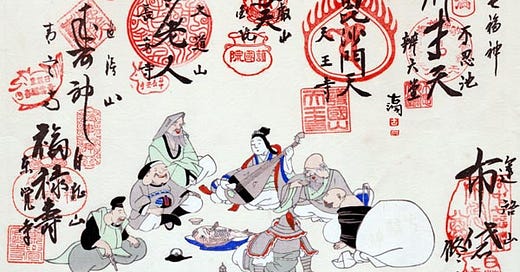Note: I took the individual photos of the Shichi Fukujin shown here on November 12, 2001, in the courtyard of Yashima-ji Temple, Number 84 on the Shikoku 88-Temple Pilgrimage.
Imagine a party in Paradise--Heaven, Valhalla, whatever. Two Indian gods and a goddess show up; they're joined by three more from China, both Daoist and Buddhist; and one more comes, from Japan.
Seem unlikely? Not if you know anything about the Shichi Fukujin, or "Seven Lucky Gods" of Japan! Which you will after this episode of
TEMPLE TALES!




